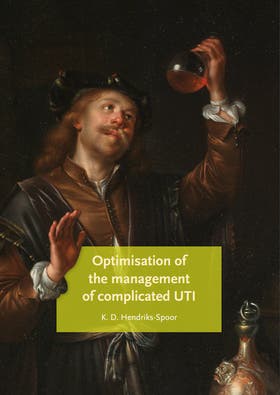Kelly Hendriks
Optimisation of the management of complicated UTI

- Datum
- (Co) promotoren
- 25-09-2022
- Marc Bonten
Theo Verheij
dr. W. Dorigo
dr. P. van der Linden
Samenvatting
Rinary tract infection (UTI) is a common bacterial infection, often seen in risk-groups like long-term care (LTC) residents, but one third of prescriptions might be unnecessary. Due to comorbidities like cognitive problems and lack of a reliable diagnostic test, UTI can be difficult to diagnose. Stil, overuse of antibiotics can result in side-effects and antibiotic resistance. In our thesis, we tried to improve antibiotic prescribing for UTI in LTC-facilities by introducing an educational program based on the Dutch guideline for UTI in fragile older adults. We showed that while antibiotic treatment-days did not decrease during the intervention, there was a decrease in prescriptions for UTI. Additionally, the study showed that the intervention resulted in less antibiotic treatment in residents with non-specific complaints. In our search to find an alternative to current diagnostic tests for UTI in LTC residents, we studied two tests that can be performed near the patient. Both tests lacked accuracy in recognizing UTI-pathogens and their susceptibility patterns, which could result in overtreatment. Finally, we studied the treatment duration of UTI in women with diabetes mellitus. We found that the risk of recurrent UTI of women with diabetes mellitus was not clinically significantly increased in women treated with nitrofurantoin for 5 days instead of guideline-advised 7 days. In summary, while optimising antibiotic treatment can be difficult due to complicated diagnostics or limited studies on treatment duration, in the coming years it remains an important topic to reduce further development of antibiotic resistance.
